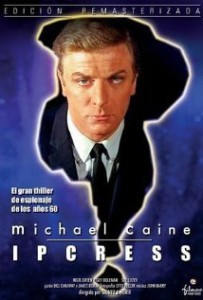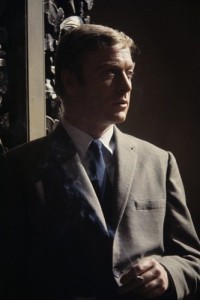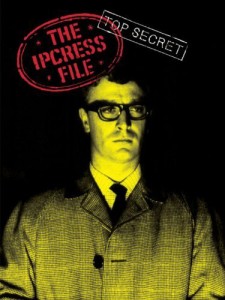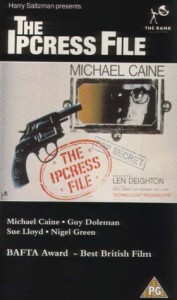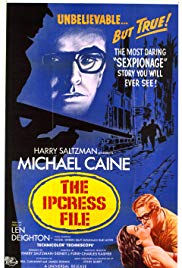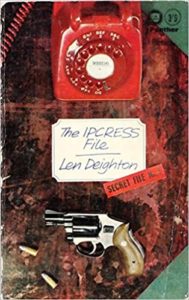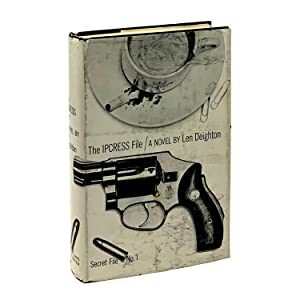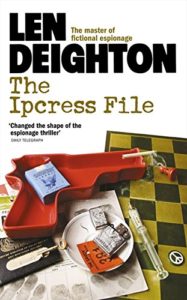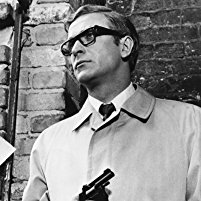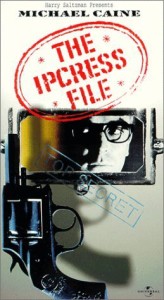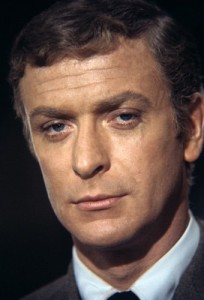The Ipcress File ***** (1965, Michael Caine, Nigel Green, Guy Doleman, Sue Lloyd, Gordon Jackson) – Classic Movie Review 2418
Director Sidney J Furie’s modishly stylish 1965 spy thriller The Ipcress File showcases Michael Caine, who gives one of his most famous, iconic Sixties performances as bespectacled Cockney secret agent Harry Palmer.
It was immensely popular and won much critical acclaim and the BAFTA Film Award for Best British Film, as well as the BAFTA Film Award for Best British Art Direction Colour (Ken Adam) and Best British Cinematography Colour (Otto Heller).
When leading Western scientists are kidnapped and reappear a few days later, it turns out that they been brainwashed and wayward British agent Palmer is sent to investigate. Considering his criminal past, is he just expendable?
This downbeat and intricately convoluted thriller, with a screenplay by Bill Canaway and James Doran based on Len Deighton’s 1962 first spy novel, was intended as an antidote to the increasingly fantastic James Bond spectacular escapist adventures, though ironically both of them were produced by Harry Saltzman. The set designs are by another key Bond creator, the production designer Ken Adam. Executive producer Charles Kasher, film editor Peter R Hunt and composer John Barry also worked on the Bond films.
Palmer is a Cockney who lives in a Notting Hill flat (the now smart area was pre-yuppie seedy at the time) and has to cope with red tape and inter-departmental rivalries and worries about his pay, in contrast to Bond’s privileged public school background and playboy lifestyle. The Ipcress File’s action unfolds in a gritty and gloomy, non-swinging London with humdrum locations and Palmer, though a foodie, shops in supermarkets. He is seen shopping in Safeway’s.
Newspaper cuttings in Palmer’s kitchen are cookery articles written for The Observer by Deighton, an accomplished cook and cookery writer. And in a scene where Palmer prepares a meal, the hands in close-up are Deighton’s.
Here, however, Len Deighton’s character of Harry Palmer (nameless in Deighton’s novel) seems just as unreal as Bond, an arguable shortcoming that is emphasised by Furie’s stylised and frenzied direction.
There is a lot of espionage fun to be had, though, in this key Swinging Sixties item, the first of three Sixties Palmer pictures, preceding Funeral in Berlin (1966) and Billion Dollar Brain (1967), and followed belatedly by two more in 1995 and 1996: Bullet to Beijing and Midnight in St Petersberg.
Also starring are Nigel Green and Guy Doleman, who are excellent as Palmer’s superiors Major Dalby and Colonel Ross, as well as Sue Lloyd (as Jean) and Gordon Jackson (as Ross).
Also in the cast are Aubrey Richards as Dr Radcliffe, Frank Gatliff as Eric Grantby (Bluejay), Thomas Baptiste as Barney, Oliver MacGreevy as Housemartin, Freda Bamford as Alice, Pauline Winter as Charlady, Anthony Blackshaw as Edwards, Barry Raymond as Gray, David Glover as Chilcott-Oakes, Stanley Meadows as Inspector Keightley, Peter Ashmore as Sir Robert, Michael Murray as Raid Inspector, Anthony Baird as Raid Sergeant, Tony Caunter as O.N.I. man, Douglas Blackwell as Murray, and Glynn Edwards as the police station sergeant.
And the title? Palmer finds a piece of audiotape marked IPCRESS that produces a meaningless noise when played. Later a book titled Induction of Psychoneuroses by Conditioned Reflex under Stress: IPCRESS is discovered.
Furie told the cast on the first day of shooting: ‘This is what I think of the script’ and set it on fire. Maybe this is why Saltzman hated him and his oddball directorial style. According to Furie, Saltzman excluded him from the editing room and later the movie’s party at the Cannes Film Festival, and even stole his best picture British Academy Award.
Saltzman claimed he fired Furie early in shooting and that Peter R Hunt had really directed most of the movie. Hunt denied this and said he tried to preserve Furie’s vision, despite Saltzman’s contrary attempts. Caine stated that he took the producer to one side and said how his harsh behaviour to people on the set wasn’t necessary.
The main melody is played on a cimbalom, a type of Hungarian dulcimer.
Two large Victorian terrace houses, at 28 and 30 Grosvenor Gardens, London, were used as studios. A large sign was painted at the entrance, reading The Dalby Employment Agency.
Caine chose to wear glasses for his character and so Palmer is the first action hero to wear glasses. Harry’s glasses frames are dark brown in a style called Teviot 74 made by the UK Optical company, and the first affordable designer frames available in the UK as alternative to the National Health Service models. After Caine’s three pairs of glasses were broken during filming, production was held up for a day until replacements were found, and the prop department brought in 20 extra pairs. Deighton wore these frames in real life. Caine also wears glasses in real life as he is near-sighted.
When Caine and Harry Saltzman tried to think of a boring name for the nameless hero, Caine suggested ‘Harry’, which Saltzman found amusing. Caine then remembered a boring classmate named Tommy Palmer.
After Christopher Plummer dropped out to star in The Sound of Music (1965), the star role was offered to Richard Harris, who turned it down to do Caprice (1967) with Doris Day.
The Ipcress File is directed by Sidney J Furie, runs 108 minutes, is made by The Rank Organisation, Lowndes Productions and Steven SA, is released by Rank Film Distributors (1965) (UK) and Universal Pictures (1965) (US), is written by Bill Canaway and James Doran, based on the novel by Len Deighton, is shot in Technicolor by Otto Heller, is produced by Harry Saltzman, is scored by John Barry, and is designed by Ken Adam.
Michael Caine turned 90 on 14 March 2023.
Canadian film director Sidney Joseph Furie turned 90 on 28 February 2023. He is also known for The Leather Boys, The Entity, The Boys in Company C, Iron Eagle, Iron Eagle II (1988) and Gable and Lombard.
© Derek Winnert 2015 Classic Movie Review 2418
Check out more reviews on http://derekwinnert.com

